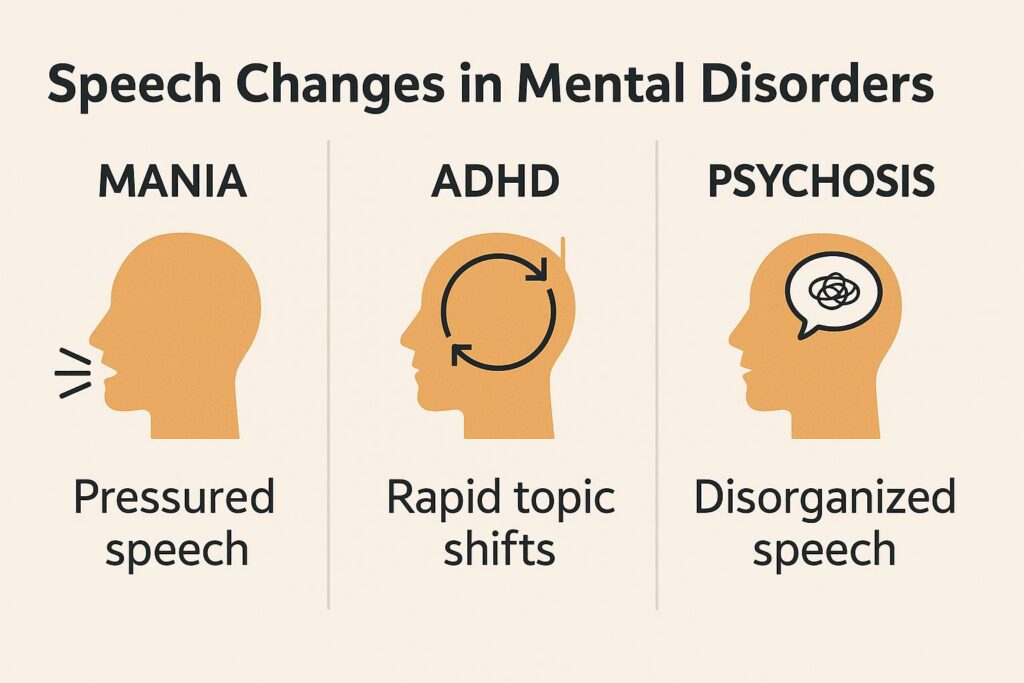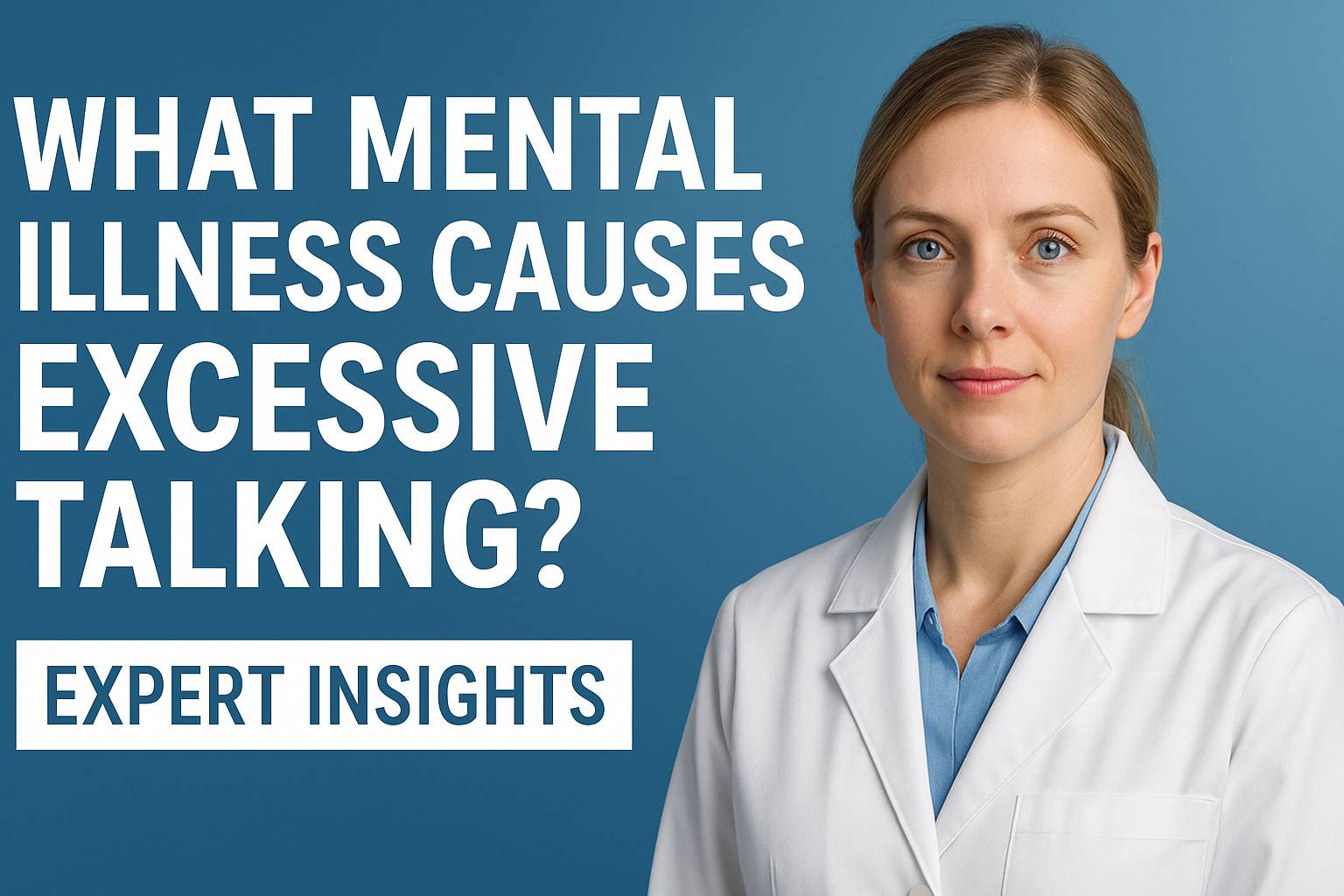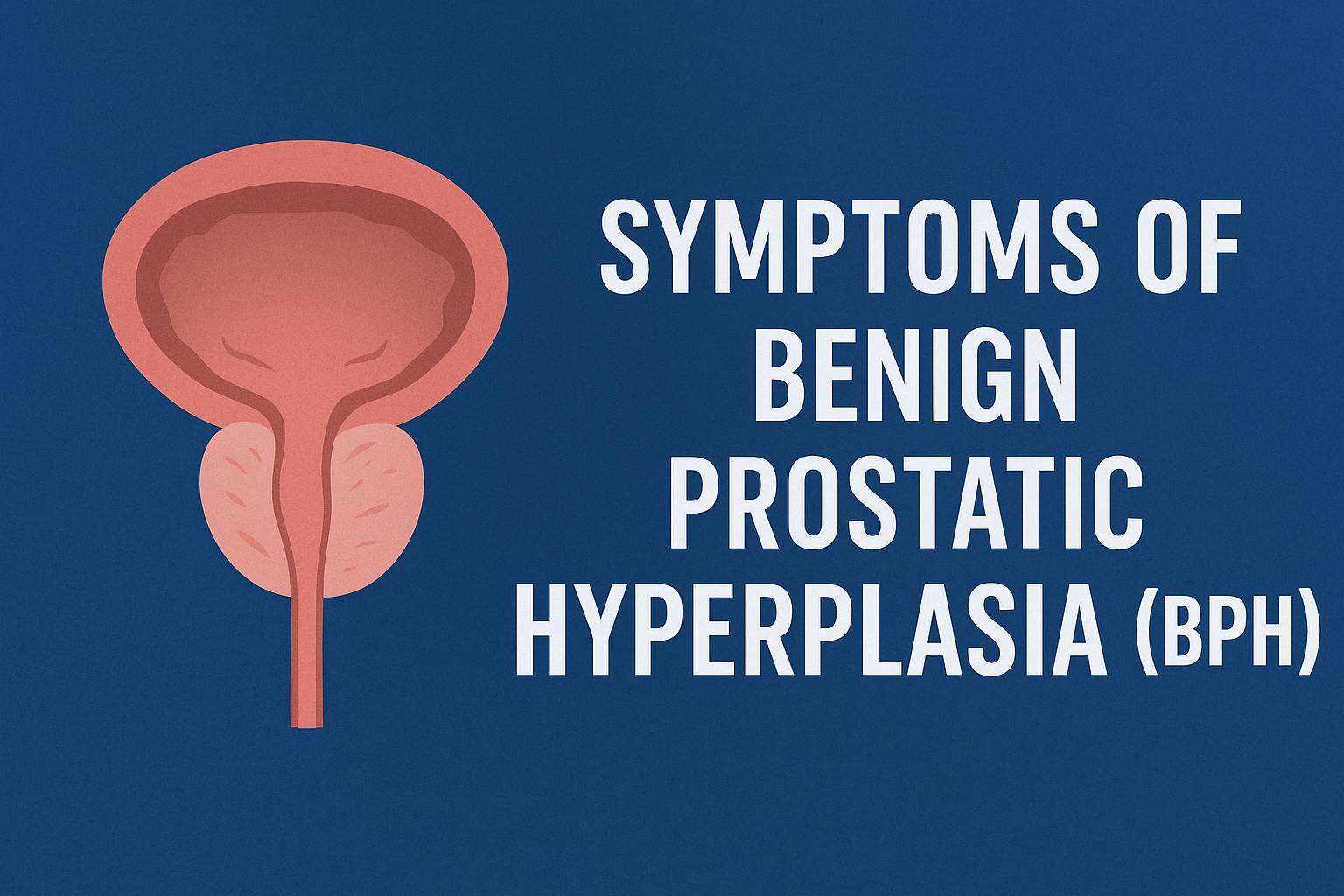Mental Illness That Causes Excessive Talking: Causes and Diagnosis

Why People Worry About Talking Too Much
Many people wonder if talking a lot is simply part of their personality or if it could be a sign of something more serious. For some, being chatty feels normal, while for others it raises concern when conversations seem uncontrollable or disruptive. Understanding this worry helps separate natural differences from symptoms that might point to a psychiatric condition.
When constant talking feels like a problem
Most people have moments of excitement when they speak quickly or at length. This alone does not mean illness. It becomes concerning when talking is so persistent that it disrupts work, school, or relationships. Patients sometimes describe it as “words just keep spilling out,” even when they want to stop.
In my practice, I have seen individuals who feel exhausted after long conversations they could not control. This sense of losing command over one’s own speech is often what drives them to seek medical advice.
Distinguishing between personality and psychiatric symptoms
Some people are naturally outgoing and talkative — this is part of their temperament. The key difference is that personality-driven talkativeness usually adapts to context. A lively person can still stay quiet in a meeting or listen when a friend is upset.
By contrast, when excessive speech appears as a psychiatric symptom, it often shows less flexibility. Speech may become pressured, rapid, or disconnected from the situation. This distinction helps doctors decide whether constant talking reflects a healthy trait or a signal of an underlying mental health condition.
What Mental Illness Causes Excessive Talking?
Excessive or pressured speech can appear in several psychiatric conditions, but it is most strongly linked to disorders that affect mood, attention, or thought patterns. Doctors see this symptom most often in bipolar disorder during manic episodes and in individuals with ADHD, though it can also occur in other contexts.
Bipolar disorder during mania
One of the hallmark features of mania is a dramatic increase in the speed and volume of speech. Patients often describe feeling like their thoughts are racing faster than they can express them, leading to nonstop talking. This “pressured speech” can make conversations difficult to follow and may overwhelm friends, family, or colleagues.

In my clinical work, I have observed patients who switch topics so rapidly that others struggle to keep up. The talking is not simply enthusiasm — it is driven by an underlying shift in brain activity during mania. Treatment with mood stabilizers can often reduce these speech changes, though early recognition is crucial to prevent escalation of manic episodes.
ADHD and impulsive speech
Attention-deficit/hyperactivity disorder (ADHD) can also lead to excessive talking, but for different reasons. Here, the issue is less about racing thoughts and more about difficulty with impulse control. A person with ADHD may interrupt, talk over others, or speak at length without realizing the impact on the conversation.

Patients often tell me they know they are “talking too much,” but stopping feels difficult in the moment. Unlike mania, this type of speech is usually less pressured but more impulsive, linked to challenges with self-regulation. Therapy and medication that improve attention and impulse control often help reduce this pattern.
Schizophrenia and disorganized speech
In schizophrenia, the problem is less about talking too much and more about how speech is structured. Disorganized speech can include jumping between unrelated topics, creating new words, or producing sentences that are hard to follow. To friends or family, it may sound like the person is “talking a lot,” but the deeper issue is a loss of logical connection between ideas.
In my practice, I have seen patients who spoke for long periods without clear direction, leaving listeners confused and concerned. This type of communication is a reflection of how the illness affects thought processes, not simply personality. With antipsychotic treatment and structured therapy, many patients show significant improvement in their ability to communicate.
Other psychiatric conditions that may involve rapid speech
While bipolar disorder, ADHD, and schizophrenia are the main conditions linked to abnormal speech patterns, other disorders can sometimes play a role. Anxiety, for example, can make someone speak quickly when they feel tense or pressured. Some individuals with certain personality disorders may also dominate conversations as part of their behavioral style.
It is important to recognize that not every case of rapid or excessive speech is caused by mental illness. Fatigue, stress, stimulant use (such as caffeine or certain medications), or neurological conditions can also contribute. That is why doctors evaluate the whole picture — speech patterns, mood, behavior, and medical history — before reaching a diagnosis.
How Doctors Diagnose Speech-Related Symptoms
Doctors do not rely on a single behavior to make a diagnosis. Instead, they look at how speech fits into the broader pattern of a person’s mood, thoughts, and daily functioning. The process usually begins with a careful clinical interview and review of medical history.
Clinical interview and patient history
During the first consultation, psychiatrists often ask detailed questions about when the excessive or rapid talking began, how often it occurs, and what situations make it worse. They explore whether the behavior changes with mood shifts, such as during periods of high energy or low motivation.
In my practice, I ask patients not only about their speech but also about sleep, concentration, and relationships. Sometimes family members provide valuable observations — for example, noting if the person has always been talkative or if the change appeared suddenly. This background helps distinguish between a lifelong personality style and a symptom of a psychiatric condition.
Observation of speech patterns
Beyond patient history, doctors pay close attention to how someone speaks during the consultation. They note the speed, tone, and rhythm of speech, as well as whether sentences remain coherent or drift into unrelated topics. Pressured speech, frequent interruptions, or jumping rapidly between ideas can suggest an underlying psychiatric condition.
In my practice, I sometimes record brief observations in the chart such as “speech rapid, difficult to interrupt” or “tangential responses.” These details provide objective evidence that helps differentiate between normal enthusiasm and a symptom of illness. Observing the speech directly is often more reliable than relying only on self-report.
Ruling out medical and neurological causes
Not every case of excessive talking is linked to a mental disorder. Doctors also consider medical explanations such as thyroid problems, medication side effects, or stimulant use. Neurological conditions, including certain types of brain injury or dementia, may alter speech as well.
This is why a full evaluation often includes basic lab tests, review of prescriptions, and sometimes brain imaging. I have seen patients referred for psychiatric care whose symptoms turned out to be caused by an overactive thyroid or medication interactions. Ruling out these possibilities is essential to avoid misdiagnosis and to ensure the right treatment plan.
Examples of Speech Changes in Different Disorders
Speech can reveal important clues about mental health. The way someone talks — whether too fast, too long, or off-topic — often reflects what is happening in their mind. By comparing patterns across conditions, doctors can better understand whether talking too much signals a disorder or simply a personality trait.
Pressured speech in mania
One of the hallmark signs of a manic episode in bipolar disorder is pressured speech. The person may talk rapidly, jump from one idea to another, and seem almost impossible to interrupt. This is not just enthusiasm — it reflects a surge of brain activity that makes thoughts race and spill out in words.
In my practice, I have spoken with patients who described the experience as “my mouth can’t keep up with my brain.” Listeners often feel overwhelmed, and the patient may later feel exhausted. Recognizing pressured speech early helps doctors adjust treatment before mania escalates further.
Rapid topic shifts in ADHD
In ADHD, speech changes come less from racing thoughts and more from difficulty maintaining focus. A person may start telling a story, then quickly switch to another idea without finishing the first. This pattern can make conversations feel scattered, even though the person does not intend to confuse others.
Patients often admit, “I know I jump around too much, but I don’t realize it until later.” Unlike mania, this speech is usually less intense but more impulsive. With therapy and medication that improve attention, many individuals learn to pause and organize their thoughts more effectively.
Tangential or incoherent speech in psychosis
In psychotic disorders such as schizophrenia, speech may appear abundant but lacks clear direction. A person might begin answering a question, then drift into unrelated topics (tangential speech), or produce sentences that are difficult to follow (incoherence). To families, it can feel like the person is “talking a lot,” but the real issue is disorganized thinking.
In my practice, I have seen patients who spoke continuously for long stretches yet left listeners unable to grasp the meaning. This type of communication reflects how psychosis disrupts the logical flow of ideas. With proper treatment, including antipsychotic medication and therapy, speech often becomes more organized as thought processes stabilize.
| Disorder | Typical speech pattern | Other core symptoms |
|---|---|---|
| Bipolar disorder (mania) | Pressured, rapid, difficult to interrupt | Elevated mood, decreased need for sleep, risky behaviors |
| ADHD | Rapid topic shifts, impulsive speech | Inattention, hyperactivity, difficulty with organization |
| Schizophrenia/psychosis | Tangential, incoherent, disorganized speech | Delusions, hallucinations, impaired reality testing |

Overtalking vs Other Psychiatric Signs
Not every instance of talking a lot means something is wrong. The difference lies in whether the speech reflects a healthy personality trait or a symptom of an underlying psychiatric condition. Doctors assess not only how much someone talks but also the setting, duration, and impact on daily life.
When it signals a disorder vs normal variation
Some people are naturally chatty and enjoy long conversations. This can be perfectly healthy when it adapts to the situation — for example, knowing when to pause or listen. By contrast, overtalking linked to a disorder often feels uncontrollable, rapid, or disconnected from context.
In my practice, I sometimes explain it this way: personality-driven talkativeness has flexibility, while symptom-driven speech tends to persist even when it causes problems. That distinction is key for diagnosis.
Why context and duration matter
A single evening of excited conversation after good news is not concerning. But if rapid, pressured talking lasts for weeks, interrupts work or study, or occurs alongside mood or thought changes, it raises red flags. Context — what triggered the behavior — and duration — how long it continues — are central in deciding whether it is normal or pathological.
Impact on relationships and daily life
Excessive or poorly controlled talking can strain personal and professional connections. Friends may feel ignored, colleagues may struggle in meetings, and families can become frustrated. Over time, this can lead to social isolation or conflict.

I have seen patients who came for treatment not because they were worried about their own talking, but because loved ones urged them to seek help. This shows how speech symptoms affect not only the individual but also their community.
When to Seek Professional Help
Many people wonder whether constant talking is just a quirk or something more serious. The safest approach is to look for red flag signs that indicate a need for professional evaluation. Acting early can make a significant difference in both symptom control and long-term quality of life.
Red flag signs that need evaluation
Some speech changes clearly suggest more than personality differences. Warning signs include:
- Talking so rapidly or constantly that others cannot interrupt.
- Speech that seems disconnected, incoherent, or unrelated to the situation.
- Excessive talking combined with severe mood swings or racing thoughts.
- Loss of sleep, reckless behavior, or signs of psychosis alongside overtalking.
- Family or colleagues expressing concern that conversations feel overwhelming or confusing.
In my practice, I often tell families that if talking is affecting safety, relationships, or basic functioning, it is time to consult a doctor. These symptoms should not be ignored.

How early diagnosis improves outcomes
Catching these patterns early gives doctors a chance to intervene before symptoms escalate. For example, diagnosing bipolar disorder at the first signs of pressured speech can prevent a full manic episode. Similarly, recognizing ADHD-related impulsive speech in childhood allows timely support that improves school and social life.
I have seen patients who sought help early regain stability and avoid major disruptions in work and relationships. On the other hand, delayed evaluation often means longer recovery and greater stress for families. Early diagnosis does not just clarify what is happening — it opens the door to effective treatment and hope for recovery.
Frequently Asked Questions
Can excessive talking be a sign of a mental disorder?
Yes, when talking is uncontrollable, rapid, or disconnected from context, it can be linked to conditions like bipolar disorder, ADHD, or schizophrenia. Doctors look at the full pattern of symptoms before making a diagnosis.
What mental illness causes excessive talking most often?
Bipolar disorder during manic episodes is most strongly associated with pressured speech. ADHD and certain psychotic conditions can also involve rapid or excessive talking.
How do doctors know if it’s ADHD or bipolar disorder?
In ADHD, speech is usually impulsive and scattered, while in mania it is pressured and linked to mood elevation. Careful history, observation, and sometimes family input help doctors distinguish between them.
Can anxiety cause someone to talk too much?
Yes, anxiety can make speech faster or more frequent, especially in stressful situations. However, this is usually temporary and less intense than speech changes seen in psychiatric disorders.
Is treatment available for speech-related symptoms?
Yes, therapy and medication can reduce rapid or excessive speech when it is caused by an underlying disorder. Supportive family involvement and lifestyle changes also play an important role in recovery.
Expert’s Closing Note
“Excessive talking can sometimes be just part of someone’s personality, but in other cases it is a sign of an underlying psychiatric condition. The key is to look at context, duration, and whether speech interferes with daily life. My advice is simple: if talking feels uncontrollable, overwhelming, or comes with other symptoms such as mood swings or disorganized thinking, do not ignore it. Early medical evaluation provides clarity and the best chance for effective treatment.”
— Dr. Emily Hart, MD
Board-Certified Physician in Internal Medicine













